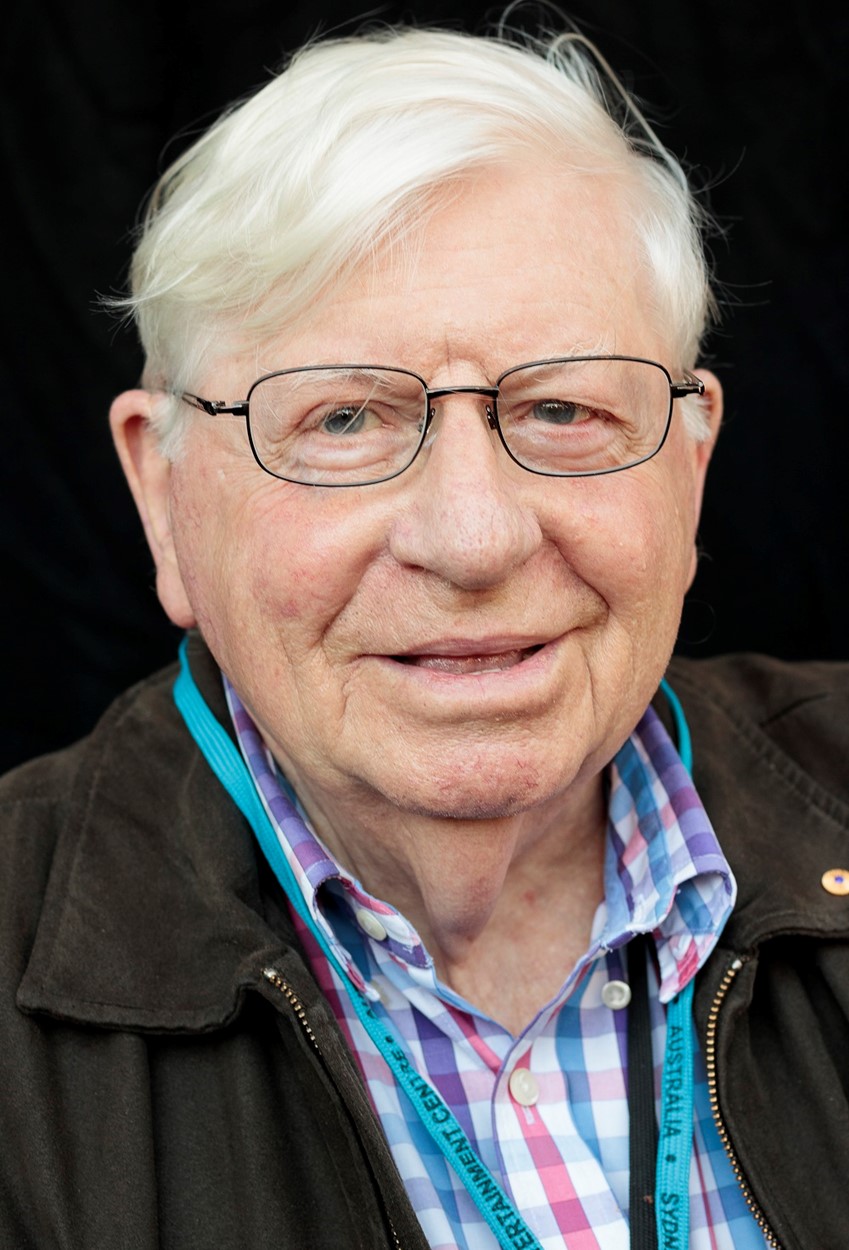News
10 Jun 2024
Audio Pioneer BILL ARMSTRONG Donates Jazz Royalties To ARCA For Crew Relief

Subscribe to CX E-News
Legendary audio pioneer Bill Armstrong AM has made a game-changing contribution to the Australian road crew community.
He has green-lighted the Australian Road Crew Association (ARCA) to release 42 albums from his jazz labels Bilarm Music and Swaggie Records to raise funds for crews in crisis. These are to be reissued (on CD and physical formats only) on ARCA’s own Black Box Records, through MGM Distribution.
The releases begin on 7th June, 2024. (see listing below)
“Crews and roadies regard Bill as an absolute legend, a truly unsung hero of the music industry,” says ARCA co-founder Ian “Piggy” Peel.
“We’re all aware how Bill pioneered recording music in Australia from the 1940s, whether it be live or studio and against all odds, and we tend to put him up on a pedestal.”
Peel adds: “Through the decades, many crew members went through Armstrong Studios and learned more about their own art.
“Bill was always willing to help by donating his time and knowledge.”
Record producer and audio engineer Mark Opitz (AC/DC, Angels, INXS, Australian Crawl, Cold Chisel, Divinyls) agrees Armstrong’s contribution was not just for musicians but a wide range of behind-the-scenes “down and dirty” roles.
“Bill’s was definitely a friend to the industry, his splendid legacy included road crew members.
“A couple of them were put on staff, in semi-managerial positions.
“They benefitted not just from Bill’s amazing technological advancements and how diverse his career was but his ability to spot new talent and back them.
“I was based in Sydney at Alberts but we all looked up to him as our mentor. Totally untouchable in what he meant to us as a figurehead.
“If you came to Melbourne to record, as I did with, say, Australian Crawl, Armstrong Studios was where you went. It was the premier studio in Australia for a long time.”
Engineer and producer Ernie Rose was an Armstrong find.
The son of a builder who was expected to follow the family business, he rang Bill every two days for a year to wrangle a job at Armstrong Studios.
Finally Bill relented, and asked him to build a studio and equip it. Pleased with the result, Armstrong made Rose a staff member.
Rose later worked with Little River Band, Split Enz, KISS, John Farnham, Diesel, Tommy Emmanuel, Courtney Barnett and Renee Geyer.
“Bill provided many opportunities. He had faith in people and their capabilities, he put a lot of trust in people who ended up talented and did great work, and remained very loyal to him.”
Honouring Bill
ARCA is in discussions with a major awards show to introduce a Bill Armstrong Award to honour music’s behind-the-scene champions including outstanding crew members.
ARCA also plans for government bodies to fund a Bill Armstrong bequest to give emerging studio producers and engineers a great career boost.
Like ARCA’s successful Desk Tape series, which raised tens of thousands of dollars, royalties from Bilarm and Swaggie will go to providing financial, health, counselling and well being services for roadies and crews.
“These will be through Support Act and the Roadies Fund, or if we are in a position to directly donate to the organisations trying to help them,” explains Peel.
Release Schedule :-
SWAGGIE JAZZ CATALOGUE
Bob Barnard (24 Nov 1933 – 7 May 2022) was once rated in the Top 10 Trumpet players in the world by an American publication after appearing at the Bix Beiderbecke Festival in the USA.
Bob Barnard –
- 1990 Australia Day Honours Barnard was made a Member of the Order of Australia (AM) for & service to music, particularly jazz.
- 1992 Mo Awards Jazz Performer of the Year
- 1996 Jazz Instrumental Performer of the Year
GROUP 1
- 1. Bob Barnard – Ned Kelly Jazz Suite (with Don Burrows, Earl Hines, John Sangster, Len Barnard)
- 2. Len Barnard & Bob Barnard – Brothers In Jazz
- 3. Bob Barnard – Riverboat Days (with Don Burrows, Earl Hines, John Sangster, Len Barnard)
- 4. Len Barnard’s Famous Jazz Band
GROUP 2 – AUSTRALIAN JAZZ LEGACY COLLECTION
- 1. John Sangster – For Leon Bismarck’
- 2. Roger Bell & his Pagan Pipers – A Vintage Collection
- 3. Lazy Ade Monsbourgh – Backroom Joys
GROUP 1 AND GROUP 2 – Release date Friday 7th June
GROUP 3 – INTERNATIONAL MASTER OF JAZZ PIANO
- 1. Earl Hines – Plays George Gershwin
- 2. Earl Hines – Plays Cole Porter & Irving Berlin
- 3. Earl Hines – Plays Duke Ellington
GROUP 4 – NEW ORLEANS JAZZ PIANO MASTER
- 1. Armand Hug – Breezin’ Along
- 2. Armand Hug – Huggin’ The Keys
GROUP 3 AND GROUP 4 – Release date Friday 5th July
GROUP 5 – LEGEND OF THE DIXIELAND JAZZ (Bob Crosby – brother of Bing Crosby)
- 1. Bob Crosby’s Bob Cats – Volume 1 1937-1938
- 2. Bob Crosby’s Bob Cats – Volume 4 1941-42
GROUP 6 – JAZZ CLARINET HERITAGE COLLECTION
- 1. Jimmie Noone’s Apex Club Orchestra 1930-1935
- 2. Pearce-Pickering Barrelhouse Jazz Band – Volume 4 – Rockin’ In Rhythm
GROUP 5 AND GROUP 6 – Release Date Friday 9th August
GROUP 7 – JAZZ PIANO HERITAGE
- 1. Earl Hines – Changin’ the Blues and Things
- 2. Teddy Wilson & Marian McPartland – Solo Piano & In Duet
GROUP 8 – MORE BARNARD JAZZ LEGACY
- 1. Bob Barnard – Looking Back
- 2. Len Barnard – The Early Years 1952-54
GROUP 7 AND GROUP 8 – Release date Friday 6th September
BILARM CATALOGUE
GROUP 9 – MORE LEGENDS OF AUSTRALIAN JAZZ
- 1. The Don Burrows Quintet – Live recording 1983 (with James Morrison, George Golla, Len Barnard, Dave Pudney)
- 2. Don Burrows with special guest James Morrison – Don Burrows Tribute to Benny Goodman
- 3. Smacka Fitzgibbon – barefoot Days
- 4. Roger Bell & His Pagan Pipers – 1968 – 1974
GROUP 10 – MORE AUSTRALIAN JAZZ LEGACY
- 1. Smacka Fitzgibbon – Honey Hush
- 2. Lazy Ade Monsbourgh – Recorder In Ragtime
GROUP 11 – MORE JAZZ
- 1. Tom Baker’s San Francisco Jazz Band – 1976 – 1977
- 2. Smacka Fitzgibbon – Live at Smacka’s Place
- 3. Steve Waddell’s Creole Bells 1979 1986
GROUP 9, GROUP 10 and GROUP 11 – Release Date Friday 4th October
GROUP 12 – CELEBRITY CHOICE (part 1)
- 1. So Rare Vol 1 – A Selection by Barry Humphries of his Favourite Gramophone Records
- 2. So Rare Vol 2 – A Selection by Barry Humphries of his Favourite Gramophone Records
- 3. So Rare Vol 3 – A Selection by Barry Humphries of his Favourite Gramophone Records
- 4. So Rare Vol 4 Barry Humphries – A Selection by Barry Humphries of his Favourite Gramophone Records
- 5. Vamp Till Ready – Dame Edna’s warm up music (Barry Humphries)
Group 13 – CELEBRITY CHOICE (part 2)
- 1.Comedy Classics – Stan Freburg, Peter Sellers, Spike Jones & His City Slickers, Spike Milligan
- 2. Ernie Sigley – Smile
- 3. Doug Aiton Jazz Favourites Vol 1
- 4. Doug Aiton Jazz Favourites Vol 2
- 5.Pete Smith Specialties – British Dance Bands Vol 2
- 6. Original Salty Dogs – Ragtime Festival
- 7. Song Of Australia – Songs of Australia
GROUP 12 AND GROUP 13 – Release date Friday 8th November
Historical Document
Like the Desk Tapes, the 41 titles are historical documents of how the likes of pianist Graeme Bell, trumpet and cornet player Bob Barnard, multi-instrumentalist Don Burrows, trumpeter Frank Johnson and banjo player Smacka Fitzgibbon helped built up the jazz scene.
They introduced America’s multi-instrumentalist Tom Baker, Chicago-based The Original Salty Dogs and singer Steve Waddell to Australia.
Bill’s Picks
Asked to select what he considered highlights from the Bilarm catalogue, Bill opts for:
- Barefoot Days – Smacka The Early Years (Song & CD Title) – Recorded 1953
- “I’ve Got What It Takes” (Song) – Tom Baker’s San Francisco Jazz Band 1976 – 1977
- “Ragtime Dance” (Song) – Lazy Ade Monsborough, Recorder In Ragtime – Recorded 1954
- “Poor Butterfly” (Song) – Don Burrows, A Tribute to Benny Goodman – Recorded 1984
Beginnings
Born in Melbourne in 1929, Bill Armstrong’s involvement in jazz began in his teens as a fan and as a recording engineer.
“It was a time of great excitement in the Melbourne jazz scene” Bill recalls.
“There were jazz clubs, offering a lot of work, and after World War II, a number of great local bands emerged.
“Graeme Bell, Bob Barnard and Frank Johnson were friends of mine.
“We got lucky but we also cared about what we were doing.
“We created a community of musicians and we enjoyed a great deal of popularity.”
While his father and brothers were builders, young Bill attended Caulfield Technical College studying electrical engineering.
In those days the course led to careers on the railways or electricity department.
But his friend Neil McRae, a technical engineer at microphone manufacturer Steans Sound Systems, taught him about audio technology and helped him build amps and a disc cutting machine by the age of 19.
The Armstrong family home at 100 Darling Street in East Malvern had an enclosed back veranda with a piano.
There Bill installed a mic and invited his friends to record themselves (his bedroom was the control room) on 78 rpm acetates so they’d hear themselves on record for the first time.
“They could hear it back immediately, and not have to wait two weeks,” Bill remembers.
“Just the look on their faces listening to themselves made it all worthwhile.”
Within 12 months, he bought a Pyrox wire recorder, which let him record at jazz gigs.
Expanding The Recordings
In 1946, Australia was the first country in the world to host a jazz festival/convention.
With his Pyrox recorder, Armstrong could record the fourth one, in 1949 (December 27) at the Prahran Town Hall, and take orders from musicians and fans who wanted to buy acetates.
The players and fans would then squeeze themselves into six old vehicles and drive around the city, stopping to play on the streets.
Armstrong set up small influential record labels as Paramount, Danceland and Magna Sound.
One of the first that he released, on vinyl, was by Smacka Fitzgibbon, with backing by Graeme Bell’s band, recorded in the Darnam Hotel in Gippsland which the banjo player owned.
“You got a good sound in them. Pubs were closed on Sundays then, so you‘d invite an audience … some of them police officers!”
The track was released under the pseudonym Frisco Joe’s Goodtime Boys, with the idea that radio would be more likely to play it if programmers thought it was by an American act.
Armstrong also had the So Rare series with close friend Barry Humphries, using the latter’s overseas contacts to collect remastered recordings of some of their favourite 78s.
Setting Up Armstrong Studios
From the mid-1950s Armstrong was engineer at radio station 3UZ, manager at W&G Records (he set up its recording studio), supervised Phillips Bell’s sound system at the 1956 Olympics in Melbourne, managed 3B’s Custom Recording department overseeing jingles, and managed Telefil Sound Recording and Film Studios.
On December 1, 1965, Bill set up Armstrong Studios in a terrace house on Albert Rd. in South Melbourne.
Run Through The Jingles
Business was brisk with jingles (including major cigarette and soft drink brands) and music acts.
Rose: “One of Bill’s legacies was the way he introduced pop music to the advertising scene in Melbourne.
“Before Armstrongs, all the commercials were done in jingle houses with an in-house music director with jazzy dance band music from the 1950s.
Bill introduced contemporary singer songwriters like Hans Poulsen, Pete Best, Mike Brady, Bruce Woodley into the jingles scene.
“He brought advertisers to pop musicians. It created a whole industry, there must have been 50 or 60 musicians who could live off the extra money they made from jingles while simultaneously also enjoying pop careers.
“This is significant: it not only made advertising hip and current but gave pop musicians the chance for a stable income.”
In time Armstrong Studio expanded to five more houses on the street, and one behind, and at one point was the only studio outside the United States to have an eight-track recorder.
Its team of engineers and producers included Roger Savage, John L Sayers, Graham Owens, Ernie Rose, David Mackay, Howard Gable, Peter Dawkins, Ted Albert and Ian Meldrum.
In 1972 Armstrong Studios moved to a new five-studio complex at 180 Bank St in South Melbourne, the site of old butter factory, and was responsible for 80% of locally recorded hits for labels as EMI, RCA, Mushroom and Fable.
In 1986, Armstrong sold the studio to The Age “to get back into my love of recording jazz”.
He set up Bilarm Music and took ownership in 2015 of Swaggie Records, which Graeme Bell had founded in 1949.
“Everything I’ve ever done in my career has been around music,” he states.
The Honours List
Bill himself was honoured in 2015 with a Member of the Order of Australia (AM).
Other top awards came from:
- The Australian Sound Recording Association (1995)
- The Audio Engineering Society (1995)
- The Melbourne Music Festival Hall of Fame (1995)
- Advance Australia (1995)
- The Australian Recording Industry Association (1999)
- The Australasian Performing Right Association (2006)
- The National Film & Sound Archive (2011)
- The Age / Music Victoria Hall of Fame (2015).
“For more information on ARCA, go to https://australianroadcrew.com.au/ and to check out the other Desk Tape releases, go to The Desk Tape Series – ARCA (australianroadcrew.com.au)”
Subscribe
Published monthly since 1991, our famous AV industry magazine is free for download or pay for print. Subscribers also receive CX News, our free weekly email with the latest industry news and jobs.




